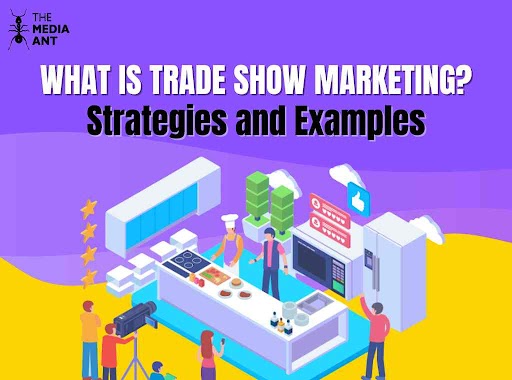Trade Show Marketing is a dynamic strategy employed by businesses to showcase their products and services to a targeted audience within a specific industry. In this digital age, where online marketing dominates, trade shows remain a crucial avenue for face-to-face interaction, networking, and generating leads. Understanding the essence of trade show marketing, its strategies, and real-life examples is essential for businesses aiming to maximize their presence and impact in the competitive market landscape. This comprehensive guide delves into the core of trade show marketing, offering insights into effective strategies and illuminating success stories that illustrate its power in B2B environments.
What is Trade Show Marketing?
Trade show marketing is a strategic promotional technique where businesses exhibit their products or services at industry-specific events. This approach aims to attract potential customers, generate leads, and enhance brand visibility within targeted markets. Through engaging booth designs, demonstrations, and networking opportunities, companies showcase their offerings to a relevant audience.
Trade show marketing is integral for fostering business-to-business (B2B) connections, expanding distribution channels, and staying competitive in dynamic industries. It’s a proactive method for companies to increase sales and establish a strong market presence.
Effective Trade Show Marketing Strategies
1. Pre-Show Engagement
Begin by creating anticipation and excitement about your participation in the trade show. Utilize social media platforms, email newsletters, and targeted outreach to inform your audience about your presence, showcasing teasers of what you’ll be offering or presenting at the event. Encourage attendees to visit your booth by offering exclusive previews, discounts, or giveaways.
2. Strategic Booth Design
Your booth should be visually appealing, inviting, and aligned with your brand identity. Incorporate interactive elements, demonstrations, or product displays that captivate attendees’ attention and encourage engagement. Ensure that your booth layout facilitates easy flow of traffic and provides ample space for conversations with visitors.
3. Engaging Interactions
Train your booth staff to be knowledgeable, approachable, and proactive in initiating conversations with attendees. Equip them with talking points, FAQs, and product information to effectively communicate your value proposition and address potential inquiries. Implement interactive activities or presentations to make interactions memorable and informative.
4. Lead Generation and Follow-up
Implement a streamlined process for capturing leads, whether through digital forms, business card collections, or QR code scans. Qualify leads on the spot to prioritize follow-up efforts post-event. Develop a personalized follow-up strategy that includes timely communication, tailored content, and offers to nurture leads further down the sales funnel.
5. Post-Show Evaluation and Optimization
Evaluate the success of your trade show participation by analyzing metrics such as lead quality, booth traffic, and return on investment (ROI). Gather feedback from both attendees and booth staff to identify strengths and areas for improvement. Use insights gained to refine your trade show marketing strategy for future events, adjusting tactics, messaging, and objectives as needed to enhance effectiveness.
B2B Trade Show Marketing
B2B trade show marketing is a strategic approach aimed at promoting products or services to other businesses within a trade show environment. It involves creating engaging displays, booths, and presentations tailored to attract the attention of potential business clients or partners. Key elements include showcasing unique selling points, demonstrating product capabilities, and networking with industry professionals.
Effective B2B trade show marketing often involves pre-show promotion to generate buzz, as well as post-show follow-ups to nurture leads. Overall, it’s about leveraging the platform of trade shows to establish brand visibility, forge new connections, and drive business growth within the B2B sector.
Why is Trade Show Marketing Important?
Trade show marketing is important for several reasons:
1. Direct Customer Interaction
It provides an opportunity for direct interaction with potential customers, allowing companies to showcase their products or services and engage with attendees face-to-face.
2. Brand Exposure and Awareness
Trade shows offer a platform for businesses to increase brand exposure and awareness within their industry. Participating in trade shows allows companies to showcase their brand identity, values, and offerings to a targeted audience.
3. Lead Generation
Trade shows are effective for lead generation. They attract attendees who are already interested in the industry or related products/services, making it easier for businesses to capture leads and potentially convert them into customers.
4. Networking Opportunities
Trade shows facilitate networking among industry professionals, vendors, suppliers, and potential partners. These interactions can lead to collaborations, partnerships, and valuable industry connections that can benefit businesses in the long run.
5. Market Research and Competitive Analysis
Participation in trade shows provides valuable insights into market trends, customer preferences, and competitor activities. Companies can observe competitors’ offerings, gather feedback from attendees, and analyze industry trends to refine their own marketing strategies and offerings accordingly.
Trade Show Marketing Examples
Here are 5 Trade Show Marketing Examples :
1. Samsung’s CES 2020 “Humanizing Technology” Experience

- What they did: Samsung transformed their entire CES 2020 booth into an immersive experience called “Humanizing Technology.” The experience showcased how Samsung’s technology is designed to improve people’s lives in real-time. For example, visitors could try on a virtual reality headset that transported them to a relaxing forest, or experience how Samsung’s AI-powered appliances could make their lives easier.
- Results: The campaign was a huge success, with Samsung receiving positive media coverage and praise from attendees. The company also reported a significant increase in brand awareness and purchase intent.
2. GE’s “Imagination at Work” Experience at SXSW 2019

- What they did: GE created a pop-up experience at SXSW 2019 called “Imagination at Work.” The experience showcased GE’s latest technologies and innovations in a fun and interactive way. For example, visitors could ride a 3D printed bike, or experience how GE’s jet engines work using virtual reality.
- Results: The campaign was well-received by attendees, with GE generating a lot of positive buzz on social media. The company also reported that the experience helped them to connect with potential customers and partners.
3. Nike’s “Unlimited You” Experience at Dreamville Festival 2019

- What they did: Nike created a pop-up experience at Dreamville Festival 2019 called “Unlimited You.” The experience allowed visitors to customize their own Nike shoes, participate in interactive challenges, and meet with Nike athletes.
- Results: The campaign was a hit with festival attendees, with Nike generating a lot of social media engagement. The company also reported that the experience helped them to connect with young consumers and build brand loyalty.
4. HP’s “The Wolf” AR Experience at CES 2020

- What they did: HP created an augmented reality (AR) experience at CES 2020 called “The Wolf.” The experience allowed visitors to step inside the world of a wolf using an AR headset. The experience was designed to showcase HP’s latest computing technology and its commitment to sustainability.
- Results: The campaign was a popular attraction at CES, with HP generating a lot of media coverage and interest from attendees. The company also reported that the experience helped them to raise awareness of its sustainability initiatives.
5. L’Oréal’s “The Beauty Tech Bar” at CES 2020

- What they did: L’Oréal created a pop-up experience at CES 2020 called “The Beauty Tech Bar.” The experience allowed visitors to try out L’Oréal’s latest beauty technology products, such as a smart mirror that analyzes your skin and recommends personalized skincare products.
- Results: The campaign was a success, with L’Oréal generating a lot of positive media coverage and interest from attendees. The company also reported that the experience helped them to connect with potential customers and partners.
Conclusion
In conclusion, trade show marketing stands as a pivotal component in the arsenal of modern business strategies, offering a unique platform for engagement and growth. Through carefully crafted strategies and leveraging real-life examples, businesses can harness the potential of trade shows to bolster their brand presence, forge valuable connections, and drive revenue. As industries evolve and competition intensifies, embracing the essence of trade show marketing and adopting innovative approaches will be key to staying ahead in the dynamic marketplace.
FAQs on Trade Show Marketing
1. How do you advertise on Trade Shows?
To advertise effectively at trade shows, focus on eye-catching displays, engaging demonstrations, interactive elements, promotional giveaways, and targeted marketing materials. Utilize social media before, during, and after the event to generate buzz and attract attendees to your booth.
2. Are Trade Shows Sales or Marketing?
Trade shows encompass elements of both sales and marketing. While they provide opportunities for direct sales interactions with customers, they primarily serve as platforms for marketing, allowing companies to showcase products, build brand awareness, generate leads, and establish industry connections.
3. Is a Trade Show a marketing channel?
Yes, a trade show can be considered a marketing channel. It provides a platform for businesses to promote their products or services, engage with potential customers, generate leads, and build brand awareness within a targeted industry or market segment.
4. What is the goal of a Trade Show?
The primary goal of a trade show is to facilitate networking, showcase products or services, generate leads, build brand awareness, and ultimately drive business growth by connecting exhibitors with potential customers, partners, and industry influencers within a specific market or industry segment.





